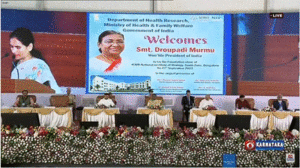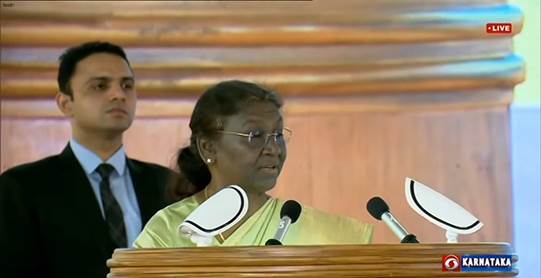- To bolster the national surveillance of outbreak-prone infectious disease agents
- Crucial to continuously monitor the regional landscape of infectious diseases in the southern states of India
- Presently, all states depend on the Virology lab in Pune for testing and strain identification
IndiGlobal Media
 President Droupadi Murmu has virtually unveiled the foundation stone for National Institute of Virology (NIV), South Zone at Bengaluru on Tuesday. It may be noted that NIV, Pune was the only Virology lab that all States had to approach for Covid testing and management and for strain identification during the first and second waves of the pandemic. Following this experience, Centre decided to set up four new NIV labs, one in each Zone.
President Droupadi Murmu has virtually unveiled the foundation stone for National Institute of Virology (NIV), South Zone at Bengaluru on Tuesday. It may be noted that NIV, Pune was the only Virology lab that all States had to approach for Covid testing and management and for strain identification during the first and second waves of the pandemic. Following this experience, Centre decided to set up four new NIV labs, one in each Zone.
Under Prime Minister Ayushman Bharat Health Infrastructure Mission (PM- ABHIM), funds have been approved to set up multisector national institutions including 4 Zonal National Institutes of Virology (NIVs) towards bio-security preparedness and strengthening pandemic research across the country.
In her address, President Murmu said, “I am glad to know that Indian Council of Medical Research has provided exemplary support for effective COVID management and is expanding its research infrastructure. National Institute of Virology (NIV), Pune is also taking all possible steps to increase R&D in the field of virology. It is good to know that National Institute of Virology has been designated as one of the collaborating laboratories of World Health Organization. The expansion of National Institute of Virology through Zonal Campuses across the country catering to the demands in the different geographical regions is praiseworthy.”
 Union Minister of State for Health and Family Welfare, Dr. Bharti Pravin Pawar highlighted the role of NIV in tackling issues of public health crisis from time to time. She said that from its inception, ICMR-NIV has led from the front in providing a rapid response to viral infections of public health importance. “ICMR-NIV investigated potential antiviral drugs, undertook several kit validations, developed new diagnostics with large-scale training which contributed in making India’s first indigenous vaccine, Covaxin”, she added.
Union Minister of State for Health and Family Welfare, Dr. Bharti Pravin Pawar highlighted the role of NIV in tackling issues of public health crisis from time to time. She said that from its inception, ICMR-NIV has led from the front in providing a rapid response to viral infections of public health importance. “ICMR-NIV investigated potential antiviral drugs, undertook several kit validations, developed new diagnostics with large-scale training which contributed in making India’s first indigenous vaccine, Covaxin”, she added.
NIV laboratory in Bengaluru will be equipped with a state-of-the-art infrastructure and expertise in handling infectious agents of various risk groups. This would be crucial to continuously monitor the regional landscape of infectious diseases in the southern states of India, and thus contribute to bolstering the national surveillance of outbreak-prone infectious disease agents.








